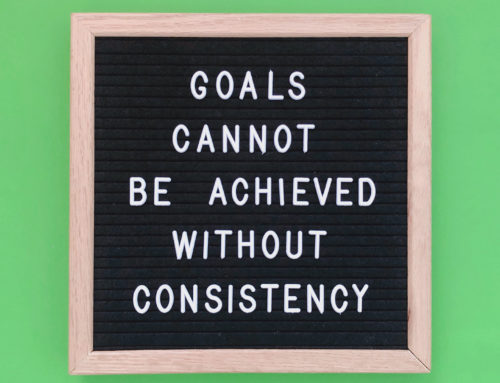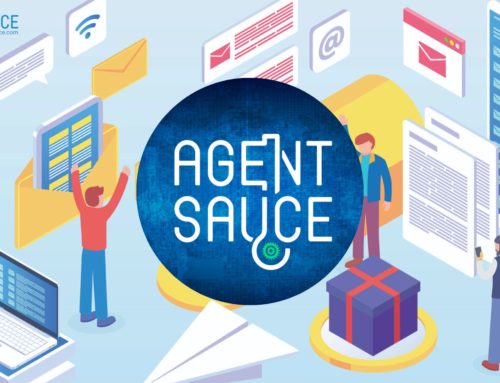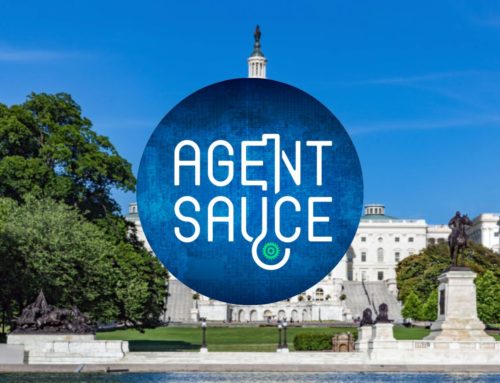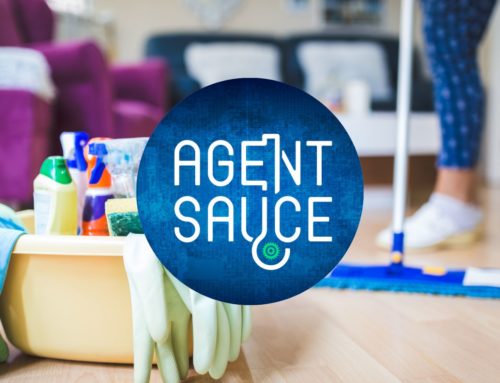In this episode we talk through many aspects of reverse mortgages. We talk about qualifying, benefits and impact a reverse mortgage can have on heirs and more…
Interview with Leeann Kearley – Reverse Mortgage Expert Podcast Transcript
Adam Small: Hello, and welcome to the Real Estate Marketing podcast. I’m Adam Small, and with me as always is Doug Karr of DK New Media.
Douglas Karr: Hello sir.
Adam Small: How you doing today Doug?
Douglas Karr: Awesome.
Adam Small: Great, and we have Kimberly Small from Agent Sauce.
Kimberly Small: Hi how are you?
Adam Small: Doing well, and we have a special guest in the office with us today Leeann Kearley, and Leeann is here to talk to us about reverse mortgages. How you doing today Leeann?
Leeann Kearley: I’m doing great.
Adam Small: Great.
Douglas Karr: Wait, Kim’s not a special guest?
Adam Small: Well she’s with Agent Sauce. So she’s not a special guest because she belongs here.
Douglas Karr: I think you’re special Kim.
Kimberly Small: Thank you, I think you’re special too. Probably in a different way.
Adam Small: Oh man. So we’ll get right back to it here. So Leeann tell us a little bit about what you do, and how you kind of got into the reverse mortgage business?
Leeann Kearley: Okay, well I have been originating mortgages since 1978 in the Indianapolis area, and in 7000, no that’s not right. In 2007, I decided to switch over to doing only reverse mortgages. So that’s the only type of financing that I do currently.
Adam Small: Okay, so now you said just a moment ago when we were talking off the air, you had an entirely different phrase for reverse mortgage, what was that?
Leeann Kearley: That’s a good question, you will hear it referred to now as a home equity conversion mortgage.
Adam Small: Okay, so that’s essentially a reverse mortgage.
Leeann Kearley: It is, it explains it better because it basically is receiving equity from your home.
Adam Small: Right.
Leeann Kearley: And the reverse mortgage has a negative connotation, and the reason is 30 years ago when they first came out, they were not a good program. And the banks made you sign the title of your home over to them.
Adam Small: Over to the bank that was doing the mortgage, right?
Leeann Kearley: Over to the bank and then you didn’t have ownership of your home. About 16 years ago, FHA became involved. So they are an insured government loan with FHA, that no longer happens.
Adam Small: And FHA is?
Leeann Kearley: Federal Housing Administration. So it’s a government insured loan.
Adam Small: Okay, great. So I’m not sure, did we actually just cover what a reverse mortgage was, or no?
Leeann Kearley: Well, there’s a lot more to it then that. That’s kind of the title.
Adam Small: Okay, so tell us what is a reverse mortgage?
Leeann Kearley: Basically, some of the requirements are you do have to be at least, one of the parties has to be 62 years of age to qualify.
Adam Small: Okay.
Leeann Kearley: And then you’re going to receive a percentage of your equity as income, and you can receive it as a lump sum payment, you can receive it in a credit line where it actually grows, or you can receive a tenure payment for lifetime. So it’s based on the age of the borrower.
Adam Small: Okay, so and it’s all against the equity of your current home, is that correct?
Leeann Kearley: Correct.
Adam Small: So depending on the type of reverse mortgage you could get a huge chunk of money up front. But how does that affect the living in the home?
Leeann Kearley: As long as that’s your primary residence, you’re able to have the reverse mortgage available to you. You do have to pay taxes and insurance. So you’re responsible for taxes and insurance.
Adam Small: On the home?
Leeann Kearley: On the home. It does have to be your primary residence. So we can’t do this on a rental, or an investment property. And basically they’re going to advance equity that you can use. You could choose to get in a lump sum payment, you could put it in the credit line, or you could set up a monthly payment. So it’s however you choose to utilize the equity that’s available to you.
Adam Small: Okay, and then what happens … I mean you said you have to be 62 in order to qualify. So at some point in time most people probably pass away during the life of this. So how does that work in regard to the home ownership, and all that?
Leeann Kearley: Well, when the last person passes away. So if it’s a couple, which a lot of times it is. If husband passes away the wife continue to live there with no mortgage payment as long as she lives in the house. Upon her passing, then the property goes to the heirs. Based on their will, they’re going to pay off whatever proceeds they used on the reverse mortgage, plus interest, and the equity will go to their heirs.
Adam Small: So if I had a half million dollar home, and used up a hundred thousand dollars of that equity, if you will, with the reverse mortgage. Then the heirs wouldn’t be on the hook for the hundred thousand dollars.
Leeann Kearley: Yes, and that’s like any other mortgage.
Adam Small: Right, right.
Leeann Kearley: So it’s like a typical mortgage. The only difference between this and a regular mortgage, of course you don’t make payments. But because you don’t make payments it’s negative amortizations. So I counsel people very thoroughly that each month they’ll get a statement, and their balance is going to go up because the best way to think about this is your not paying this mortgage. Your properties paying the mortgage when you no longer live there.
Adam Small: Right, right.
Leeann Kearley: So you’ll see your balance go up because you’re not paying interest. If you wanted to make payments you could.
Adam Small: Okay. So does it ever happen that somebody kind of outlives the value of the-
Leeann Kearley: Mm-hmm (affirmative)- That’s a good question, and because it’s an FHA loan it’s insured by FHA. So if you were to get this loan at 62, you live there for 30 years, and let’s say the values of the homes drop, which they did. And your balance is going up because you’re living there essentially for free, then FHA mortgage insurance would pay the difference. So upon your death, your heirs are not responsible. Now they don’t have an inheritance of equity, because you used it to live on.
Adam Small: They don’t get the home.
Leeann Kearley: And you owe more than the house is worth. But FHA mortgage insurance will pay the deficit, and no one is responsible for that.
Adam Small: Oh okay, so basically, I mean there’s still an inheritance there provided that you don’t outlive the value of your home, which I mean if you ended up having to sell the home anyway because you couldn’t afford to live there anymore. It’s the same situation for the heirs. So the heirs really aren’t impacted negatively.
Leeann Kearley: No they’re not. There’s no negative impact to them, and it could be a positive if values don’t go … I mean where it’s like talking about the stock market. We don’t know what housings going to do. So if it were to continue, now it’s on a growth rate. If it were to continue to grow, it could be that your heirs are going to have an actual income profit. They’re going to get an asset when you sell the house. But we’re not going to guarantee that, because again, we don’t know.
Adam Small: Well you can’t, you never know what’s going to happen, right?
Leeann Kearley: Right.
Adam Small: You know a zombie apocalypse or something, right?
Leeann Kearley: Right, well you have to prepare for it.
Adam Small: Exactly.
Douglas Karr: They don’t need homes.
Adam Small: Zombies don’t?
Douglas Karr: No.
Adam Small: Nah, they don’t care where they live, do they?
Douglas Karr: No.
Adam Small: Alright, so now earlier you said that you had to be 62 in order to qualify. What other kind of qualifications are there?
Leeann Kearley: Basically 62, it has to be your primary residence. We will do a financial assessment, but we don’t look at credit scores. So it’s not as stringent as a regular forward mortgage approval processes. We don’t look at credit scores, and we don’t look at debt ratio. So we look at residual income. So a lot of people that could be denied for a traditional mortgage would be approved for this, because of the fact that we’re not looking at the score, and we’re going to just make sure they’ve got enough income to pay their taxes and insurance.
Adam Small: Okay, and what if I owe on my home? Say it’s valued at $500,000, and I owe $250,000 on it, how does that work? Can I get a reverse mortgage, or does the home have to be paid off, or how does that work?
Leeann Kearley: You can have an outstanding mortgage and get a reverse. However, in the example that you just sited, we are lending 40% of the value of the home. So we’ll do an appraisal, and we’ll lend 40%. And then with that 40% we’ll pay off the mortgage. So if you owe more than 40% equity, you would have to bring that difference to closing out of your own pocket.
Adam Small: Okay. So now, if the home was paid off, the 40% thing doesn’t come into play, is that what I hear you saying?
Leeann Kearley: That’s how much we’ll lend. If the home is $100,000, you’re going to get $40,000 to supplement your income. That’s your reverse mortgage proceeds that you receive as income.
Adam Small: Okay.
Leeann Kearley: And if you had a $40,000 mortgage, then you’re not going to have any income, but we’re paying off your mortgage. So that’s the amount of money you get, and you just allocate it based on whether you have a mortgage, or whether you own it free and clear.
Adam Small: Oh okay. So you only lend 40% of the value of the home.
Leeann Kearley: Right, that’s correct.
Adam Small: So generally speaking, worse case scenario, somebody should typically end up in a net positive there from an heir’s perspective, is that correct?
Leeann Kearley: Correct. That’s why we do that because we don’t want the house back. So we definitely are going to make sure that they have a good equity position, so there’s an incentive for them to sell it.
Adam Small: Right, okay. Well that makes sense. So do both parties have to qualify. Say it’s a married couple, do both parties have to qualify, or just one?
Leeann Kearley: Only one has to be 62.
Adam Small: Only one has to be 62.
Leeann Kearley: Only one has to be 62 years of age.
Adam Small: And then beyond that you’re just looking at the income, and stuff like that.
Leeann Kearley: Mm-hmm (affirmative).
Adam Small: Okay, interesting, very interesting.
Kimberly Small: Who should consider this type of loan? Obviously people that need extra monthly income, anybody else? Any other things that they should consider that this type of loan would help them?
Leeann Kearley: Well it used to be, I would say eleven years ago when I first became involved in this industry, it was the loan of last resort, is what they would say. Now, financial advisors, and elder law attorneys are really good referral partners to me, because if you do own your home free and clear, and you set up a credit line; there’s a growth rate attributed to that. So I show you with an amortization schedule how you’re actually going to have more money available to you to give you an example, and of course it’s based on the value of the home. But I just did an example for gentlemen his home was worth $425,000. So he’s going to have about $190,000 in his credit line, immediately, because his home is owned free and clear.
In twenty years, that $190,000 would grow to about half a million. In thirty years he’s going to have a million dollars in that account. So if you do that early, and he is at 62. When he’s 92, he’s going to have over a million, and it’s kind of like annuity, it’s based on his age. And he’s using it for long term care insurance, because his wife is diabetic. She won’t be approved for long term care insurance health wise, medically, and she also can’t afford it. So he’s strategizing, and he’s using this account to grow so he can pull from it, and he’ll have that money available.
Douglas Karr: Wow.
Leeann Kearley: And that’s what a lot of people don’t realize that, and that’s why financial advisers are jumping on board and saying, “Let’s strategize, so instead of cashing out your investments, live on the equity in your home. Use it for another purpose, and then you can keep your investments safe.”
Douglas Karr: I mean how great a thing too, I mean if you’ve worked your whole life, 62 years old, and you’re starting to run into money problems, and you have this incredible asset under you. Now you can live the rest of your days out comfortably, and not have to worry about it, and not have to worry about your kids and everything else. So how long from the time that someone decides that they might want to do this, what’s the process like to get approved, and what’s that timeline like?
Leeann Kearley: Usually about 45-60 days.
Douglas Karr: Oh wow.
Leeann Kearley: There is reverse mortgage counseling, it’s a third party agency that requires that they do this counseling, and that’s just to keep, that’s just so that they understand it. And to make sure that I disclosed all the fees, that the loan officer has told them, “Okay, this is negative amortization. These are the fees that you’re going to pay.” Just to make sure that they’re protected, and they understand how the program works.
Adam Small: Ah, very interesting.
Douglas Karr: That’s incredible.
Adam Small: It is. What about real estate agents? Now you said that financial advisors, and planners, and stuff like that are really liking the program. So they’re probably referring quite a few people to you.
Douglas Karr: Yes.
Adam Small: How does it work with real estate agents? I mean are you approached by real estate agents, are they aware of this type of program? Because I know that a number of real estate agents work with empty nesters, and that sort of thing, and they help people that have kind of reached that stage in their life, and they downsize or whatever. Or maybe they don’t want to, maybe there was an unexpected death or something. So do you work with a lot of realtors, or a lot of realtors know about what you’re doing?
Leeann Kearley: A lot of realtors do not know about it. So a lot of my job is education, because the examples that I’ve been giving you are all about a reverse refinance, someone who lives in the home. But you can do it as a purchase. It’s the same requirements. You would put 60% of the value of the home down, but the other 40% you could finance as your reverse mortgage and have no mortgage payments. We’re finding that builders really love this, because builders love the upgrades. They want to sell the garden tub, and all the upgrades that the people want.
Adam Small: The shiny brass, and all that, yeah.
Leeann Kearley: Right, and so they can afford 40% more upgrades because they don’t have to worry about what it does to the payment.
Adam Small: So if you wanted to purchase a home as long as you had 60% of the value, you could purchase the home and then not have a home payment for the rest of your life.
Leeann Kearley: Correct.
Adam Small: And pass it on to your children as well when you are done.
Leeann Kearley: Yes.
Adam Small: That’s insane. I mean it’s like buying a home for 60% of the value, and not having to worry about it.
Leeann Kearley: Absolutely.
Adam Small: So that’s nuts.
Leeann Kearley: And before the empty nesters would use all their cash to downsize, and now they can keep that money available to them for emergencies, or whatever, and still afford the house that they want. So, and realtors like it because their commission is increased because the value of the home.
Adam Small: 40% more, yeah exactly, I gotcha. Exactly.
Kimberly Small: Can any lender do a reverse mortgage, or their special qualifications that you’ve had to go through in order to do these types of loans? What should somebody ask a potential lender when considering a reverse mortgage?
Leeann Kearley: That’s a good question. Most lenders do not do this, only a few specialized lenders do it. It’s an FHA program. Now as a loan officer I’m licensed, and all loan officers now have to be licensed. But you would have to check and make sure that in fact, do they even offer that program? And then maybe see if you have a loan officer that’s local, that you can meet face to face instead of trying to do it on the internet, or through the mail.
Kimberly Small: Anywhere that they can go to a site that has, where they can find someone that specializes in this type of loan?
Leeann Kearley: If they just want general information, they could actually just look at the FHA government website, and it would tell them all the parameters. As far as finding a specific person, you are licensed in each state. So for instance if someone called me from Florida, I could not personally help them. But I could get them to someone who could. I’m only licensed in Indiana.
Kimberly Small: Okay.
Adam Small: So if you want information you can go, it’s probably FHA.gov would be my guess.
Leeann Kearley: Yes, that’s correct.
Adam Small: Are there any organizations, now you said you have to be licensed and certified. So is that specific to the reverse mortgage program, or is there a certification license specific to that? Or is that just a national under certification?
Leeann Kearley: It’s just a national. So when you get your license you have to know how to do-
Adam Small: So it’s a part of every lender has to know about those programs.
Leeann Kearley: Yes.
Adam Small: And that’s actually a really good thing.
Leeann Kearley: Yes, now they may not all offer them. But there’s questions about reverse mortgages when you go to take your licensing test.
Adam Small: Okay great. So everybody should know, at least the core of it anyways.
Leeann Kearley: The basics.
Adam Small: Right, yeah, so Doug you got something?
Douglas Karr: I just, I have an elderly mom, and as soon as I said reverse mortgage to her, she just about had a stroke.
Adam Small: Blew the roof off the house, right?
Douglas Karr: And it’s because of the lasting misinformation, or the previous program. So fifteen years, you guys are still fighting a-
Leeann Kearley: Absolutely.
Douglas Karr: Fighting that stigma on it, and so this is good. I’m going to make my mom listen to this.
Leeann Kearley: Yeah.
Adam Small: Just make sure she comments to you, and not to us.
Leeann Kearley: Well I can show them a specific examples, I can show them in writing, and then the counselor’s going to go over with them, and say, “This loan is still your home, you’re free to pay on it, you’re free to sell it. You can do whatever you choose to do.” But we have to get to that point, because like you say most people just cut us off when they hear reverse mortgage.
Adam Small: Right.
Douglas Karr: Right. Well I’m going to say, what was the other term?
Leeann Kearley: Home equity conversion mortgage.
Douglas Karr: That’s what I’m going to tell her.
Adam Small: You’re going to fool her with that, right?
Douglas Karr: Yeah, I’m going to fool her with that.
Adam Small: I think you should look into this.
Douglas Karr: A home equity conversion.
Adam Small: There you go. You know maybe we covered this earlier, maybe not I don’t recall actually. We’ve only been talking about fifteen minutes, and I don’t recall. Even if you do qualify, are there people that really shouldn’t do a program like this even though they qualify?
Leeann Kearley: Yeah it’s a longterm loan, because there’s fees involved. So if you said, “I’m going to sell my house and move to Florida in six months.” I’d say you shouldn’t do it, because of the fees that are involved. You need to know that hey, this is where I plan on staying. Now we know life can throw a curve, and it can change their plans. But if they specifically say, “Hey, my goal is to stay here.” Then they absolutely should look at this as a viable option.
Adam Small: Yeah, and if they know that they’re moving in the next year or two, then they not touch it.
Leeann Kearley: I would not recommend it.
Adam Small: Any other circumstances where you maybe wouldn’t touch it?
Leeann Kearley: Oh I think if you just wanted … I had someone contact me and they wanted a car loan, and they were buying a used car for $10,000. I said, “I think you should just get a home equity, a regular loan.” Where you have to make payments, but for $10,000, the fees are going to be about half that, so why would you bother doing it.
Adam Small: Oh wow.
Leeann Kearley: It’s not feasible at that point. Or I mean lets face it, not everybody should stay in their home. I had a daughter that lived in Ohio, the adult daughter. Dad had dementia, and mom was blind, and she wanted to get a reverse and keep them in Indiana, and I said, it doesn’t sound to me like they should be staying in their home.
Douglas Karr: Sounds like they should be closer to you, right?
Leeann Kearley: Yeah, they need assisted living. Now I will say-
Adam Small: Need to look at your whole circumstance.
Leeann Kearley: And it’s so different for everyone. My oldest client was 96, and she was in hospice care. And she took out a reverse mortgage to stay in her home, and pay for 24/7 care.
Adam Small: The hospice at the home, yeah.
Leeann Kearley: But you know in hospice care your life expectancy is six months, and she lived a year and a half. And I think it’s because she stayed in her house, and she hired someone to take care of her.
Adam Small: She was happy where she was, yeah.
Douglas Karr: You’re right, you’re absolutely right. Well curious at that point, this is the terrible question. But so then you die, what happens then? Is it that you’re basically your kids notify the mortgage lender?
Leeann Kearley: Yes, and then the lenders going to give them up to a year to market that house, sell it, and pay off the reverse mortgage. The mortgage isn’t going to be called due immediately. They understand that you need to make arrangements, and as long as you keep in contact and say heres a listing agreeing, I’m making an effort. It’s going to be fine, and then you pay off the mortgage like any other mortgage and the equity goes to the heirs.
Adam Small: They don’t necessarily have to pay off the mortgage, or I’m sorry. They do have to pay off the mortgage, but they don’t have to necessarily sell the home if they pay the mortgage off, is that correct?
Leeann Kearley: Good point, they could get a traditional mortgage and stay in that house.
Adam Small: Right, okay.
Leeann Kearley: If it’s the family homestead, and they don’t want to lose it. They can keep the home, but they have to pay off the reverse, because the reverse was in-
Adam Small: It’s a debt that’s owed, right?
Leeann Kearley: Yeah.
Adam Small: Yeah, exactly.
Leeann Kearley: And it was based on that one persons life expectancy.
Adam Small: But if they’re able and capable of getting a mortgage, then they can keep the home and continue on, right?
Leeann Kearley: Absolutely.
Adam Small: Right, right. Cool, very cool. So you used the example with the man whose wife had diabetes. Do you have another example that wouldn’t necessarily be medically related, that would kind of illustrates how it could benefit somebody.
Leeann Kearley: Oh gosh, I’ve got lots of them. Now this is something that’s happening. Statistically they’re showing that seniors are having a high percentage of divorce. And so I had a woman who came to me, she had to pay her ex husband $40,000. There was a lien against her house, the only way to pay it would be to sell the home. So once we did the appraisal she had enough on her reverse mortgage equity proceeds. We paid the husband the $40,000, we paid off her $30,000 mortgage, she received $12,000 at closing, and then she had $40,000 in the credit line that I discussed earlier that each year is going to actually increase if she doesn’t touch it.
So she went from being basically homeless, having to pay her ex.
Adam Small: $70,000 in debt.
Leeann Kearley: Right, to retaining her home, and having an estate.
Adam Small: Nice. So there’s really, there’s a real strong case for at least exploring the options here, right?
Leeann Kearley: Mm-hmm (affirmative).
Kimberly Small: Anything else you want people to know about reverse mortgages? How they’ve changed, or any other misconceptions that people have that?
Leeann Kearley: I think the number one is just you don’t know what you don’t know, and I promise you if you would just give me thirty minutes to talk to you. I’ll teach you something new, and you’ll find out that it is not the loan of last resort, and it’s going to really help you retire well.
Adam Small: Very nice, alright.
Douglas Karr: It just sounds a perfect way for me to spend my kids inheritance.
Leeann Kearley: Well, I mean do you want to send them a check after you die, or you want to take them to Disneyworld and ride the roller coaster with them?
Adam Small: Oh he wasn’t talking about taking them anywhere, just so you know.
Leeann Kearley: Oh, are you kidding me? Okay.
Douglas Karr: I’m going to leave them the vacuum cleaner.
Adam Small: Alright, well I don’t have anything else to ask you. It’s been really great talking to you. Kim, do you have anything?
Kimberly Small: I’m good.
Adam Small: Doug?
Douglas Karr: No, it’s great information, and you did it so concisely, so that’s awesome.
Adam Small: Well thanks so much for joining us Leeann, it’s been a pleasure, and really informative. And all the listeners out there, thank you for listening, and we’ll see you next time on the Real Estate Marketing podcast.







